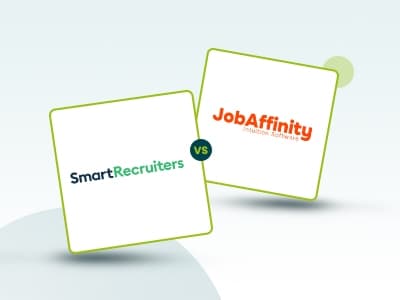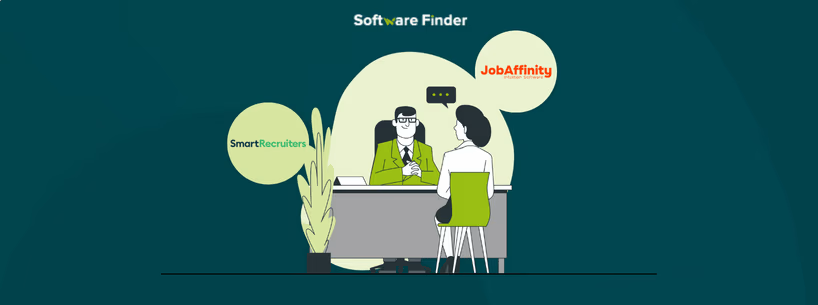
In today's competitive talent market, recruitment platforms play a crucial role. Applicant Tracking Systems (ATS) are employed by around 75% of recruiters and 98% of Fortune 500 companies. These solutions significantly accelerate the hiring process by reducing time-to-hire by up to 60% while increasing hire quality by 78%.
SmartRecruiters and JobAffinity are popular platforms that offer core ATS capabilities, but they differ in terms of scale, automation, and sophistication.
The comparison of SmartRecruiters vs JobAffinity breaks down the essential features, strengths, weaknesses, and prices to help you determine which solution is better suited to your recruiting needs.
Features | SmartRecruiters | JobAffinity |
Job Posting And Distribution | One-click posting to 300+ job boards with performance analytics via SmartDistribute | Easyposting tool for one-click multi-channel posting with GPT assistance and centralized tracking |
Applicant Tracking System (ATS) | Customizable workflows, AI-driven automation, resume parsing, and collaborative feedback tools | Central dashboard, CV preview, one-click rejection, candidate tagging, and built-in messaging |
Talent Pool | SmartCRM-based segmentation, email campaigns, and candidate nurturing with compliance and performance tracking | Searchable CV library, LinkedIn imports, semantic/geolocation filters, and candidate pool management |
Workflow Management | Custom hiring workflows with SLA timers, step owners, conditional logic, and full process automation | Internal comments, manager reviews, real-time notifications, automated reminders, and status tracking |
Reporting And Analytics | SmartAnalytics module with customizable dashboards, historical data, visual pipeline insights, and role-based permissions | Built-in report library tracking sources, diversity metrics, time-to-hire, and customizable exports |
Pricing | Starts from $14,995/year | Starts from €79/user/month |
SmartRecruiters is a modern recruiting software designed to support both corporate and high-volume hiring. It helps teams hire quickly and intelligently.
The software combines a user-friendly interface with powerful workflows, streamlining each stage of the recruitment process to boost efficiency and productivity.
Unique Features Of SmartRecruiters
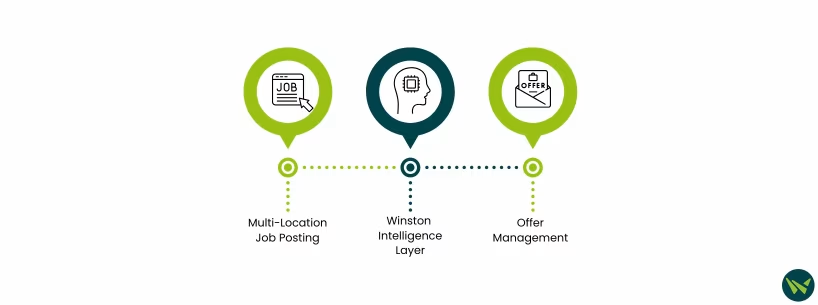
- Winston Intelligence Layer: Employs artificial intelligence (AI) to anticipate recruiter needs, automate tasks (screening, scheduling, follow-ups), and provide real-time, adaptive guidance, resulting in increased productivity and smarter hiring decisions
- Multi-Location Job Posting: Allows you to publish a single job position across cities, facilitating recruitment for distributed teams without the need to create separate requisitions
- Offer Management: Enables customizable offer letter templates and clauses, real-time approval routing, bulk emails, and e-signature integration, all of which help in accelerating applicant acceptance and streamlining workflows
SmartRecruiters Pros And Cons
Pros
- Streamlined offer approvals help simplify the approval process by combining parallel and sequential workflows to enhance flexibility
- The candidate self-scheduling feature allows candidates to book interviews directly on interviewers’ calendars, reducing scheduling conflicts
- Allows posting to major job boards while providing possibilities for adding specialty, industry-specific boards
Cons
- Candidate filtering is limited to city only, lacking the ability to sort candidates by state
- Customizing scorecards, particularly adding text boxes to individual questions, can be hectic, needing significant time and manual efforts
JobAffinity, developed by Intuition Software, is a recruiting software designed to streamline and improve the hiring process. It caters to businesses, recruitment firms, staffing agencies, ESNs, and public organizations.
The platform assists over 4,000 recruiters in optimizing their workflows and managing their hiring more efficiently.
Unique Features Of JobAffinity
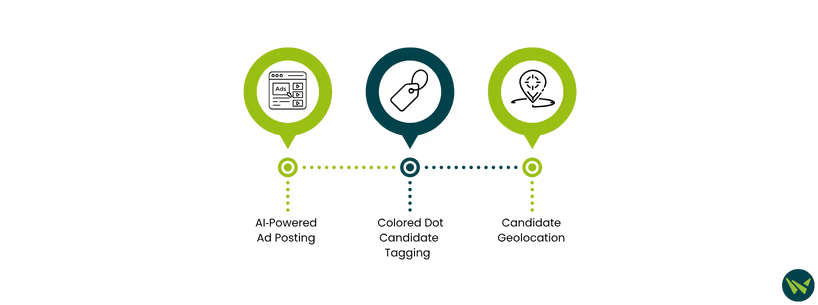
- AI‑Powered Ad Posting: Incorporates one-click posting to major boards, GPT-powered ads and emails, integrated surveys, templated ads, and centralized applicant tracking, all from a single dashboard
- Candidate Geolocation: Automatically detects the distance between a candidate's address and the job location based on CV parsing or form input. It displays proximity immediately, allowing for more efficient local sourcing
- Colored Dot Candidate Tagging: Helps recruiters quickly select applicants for short-term selection. These user-specific tags enable group actions and preserve selections during workflow interruptions
JobAffinity Pros And Cons
Pros
- Flexible automation and workflows enable teams to streamline hiring tasks and adapt processes to suit their recruitment strategy
- The innovative zero-click preview concept streamlines application screening and filtering for faster decision-making
- Dedicated support resources deliver a seamless user experience with personalized onboarding, comprehensive tutorials, and prompt, responsive assistance
Cons
- The platform does not offer hands-on testing/ trial; access is limited to just a demo version
- The back-office support is only available in French and English, which can restrict usability for non-bilingual teams
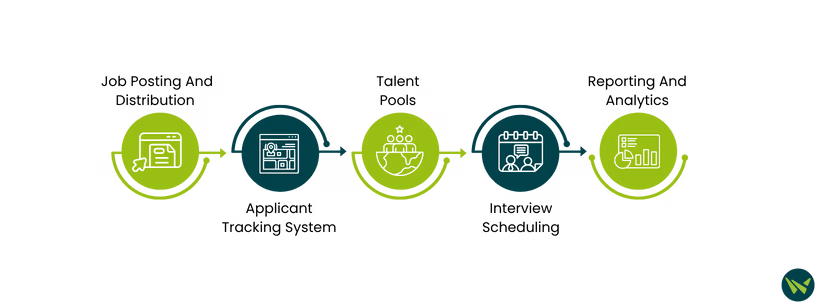

SmartRecruiters offers tiered annual subscriptions tailored to business size and complexity. The pricing starts with core features and scales up to full enterprise capabilities.
- Essential: From $14,995/year (includes ATS, CRM, onboarding, SMS, job distribution, dynamic scheduling)
- Professional: Custom Pricing (Includes all Essential features + AI Hiring Agent, Talent Matching, add-ons)
- High Volume: Custom Pricing (AI Screening, Conversational AI Chat, expanded SMS, and distribution volume)
- Complete: Custom Pricing (Full suite with advanced analytics, sandbox, custom guidance, premium career site, enterprise controls)
Disclaimer: The pricing is subject to change.
JobAffinity provides transparent, month-to-month subscriptions with no long-term commitment. The cost drops as the number or type of users increases. Its various pricing plans include optional modules for freelancers and large businesses.
- Starter: €79/user/month (includes multi-posting (3 boards), unlimited jobs and CVs, AI tools, CV search, standard reports, SSO, human chat support, marketplace)
- Premium: €220/user/month (unlimited posting, AI assistant, natural language search, career page, advanced reports, phone support)
- Infinity: Custom pricing (offers unlimited users, advanced permissions, approval workflows, full ATS customization, and priority support)
Disclaimer: The pricing is subject to change.
SmartRecruiters and JobAffinity are robust recruitment platforms that cater to distinct organizational needs. If you're an enterprise or a scaling organization seeking advanced automation, global job distribution, CRM-style talent nurturing, and deep analytics, SmartRecruiters is the right option. Its end-to-end features make it perfect for large-scale recruitment and complex workflows.
Choose JobAffinity if you are a small to mid-sized company that requires ease of use, flexible pricing, and essential ATS capabilities with intelligent automation. It provides excellent value for recruiters needing efficiency without complex processes.
Ultimately, the best option is determined by your hiring volume, budget, and level of process complexity.
